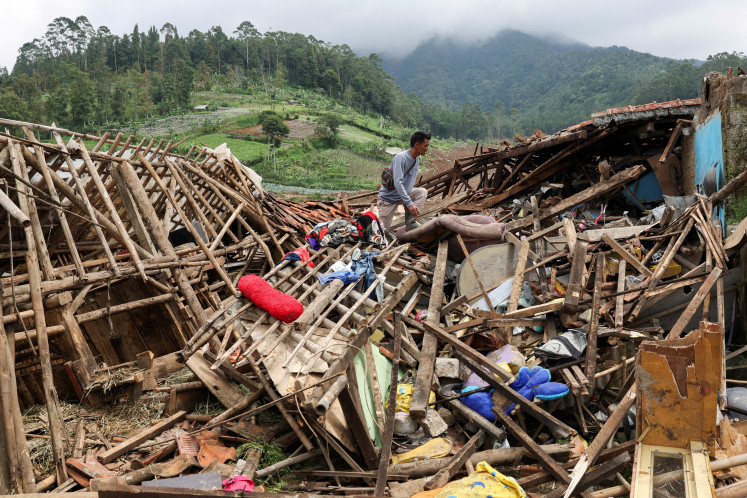Popular Reads
Top Results
Can't find what you're looking for?
View all search resultsPopular Reads
Top Results
Can't find what you're looking for?
View all search resultsCity threatens to outlaw street kids, imprison parents
Where to begin?: Women carry toddlers while begging from passers by on Jl
Change text size
Gift Premium Articles
to Anyone
W
span class="caption">Where to begin?: Women carry toddlers while begging from passers by on Jl. Perintis Kemerdekaan, East Jakarta, in this file photo. Cases have emerged where babies were “rented out” to beggars, based on the principle that those with babies gained more sympathy and thus earned more. Some parents have even forced their children to go out and beg on the streets, exposing them to crime and disease. JP/Ricky Yudhistira
Jakarta administration announced Monday that by the end of the year it would ban children from working on the streets.
“This is part of the Social Ministry plan,” Jakarta Social Agency head Budiharjo said.
Budiharjo said his agency would work with the city police, the Jakarta Education Agency, public order officers and other related agencies.
He said that his agency had begun compiling a survey of street children on Monday.
“Children from poor families who come from regions outside Jakarta will be sent back to with their families in their hometowns. We have made agreements with the administrations in Banten, West Java and Central Java regarding this. It will be their responsibility to take care of the children,” he said.
Street children whose parents have Jakarta ID cards may choose to return to school or to learn life skills at one of the city’s six rehabilitation centers or in classes organized by the Jakarta Education Agency.
The street children, he said, could enrol in the free nine year compulsory education program.
According to the social agency, there are around 4,200 street children in Jakarta.
The children are vulnerable to becoming victims of or being manipulated by adults around them.
A recent case involved Baekuni, 60, a man who acted as a patron of the children, who turned out to be a pedophile who raped and killed them. He admitted to have killed seven street children.
Another case involved a man known as Abang Kaca Mata, 24, who raped 15 children in the past
six years.
Budiharjo said the Agency would also establish communal business groups in community units for the parents of street children.
“If parents can earn enough for their families, there is no reason for the children to work,” he said.
He said that the groups would receive life skills training and Rp 5 million capital for each person. The agency would also ask the heads of community and neighborhood units to supervise the groups.
The daily hunt: A girl removes fleas from her friend’s hair during a break on Jl. Gatot Subroto, South Jakarta, in this file photo. Both are street musicians. JP/R.Berto Wedhatama
Budiharjo added that the city police would also arrest parents who let their children work in the streets.
“Such parents are exploiting their own children and should be imprisoned,” he said.
According to the 2002 Law on Child Protection, anyone sexually or economically exploiting children faces a maximum penalty of 10 years’ imprisonment.
Edi Saidi from the Urban Poor Consortium disagreed with the plan to arrest street children’s parents.
“Who will take care of the children if their parents are imprisoned? The children will only suffer more,” he said.
He added that the city administration should provide not only capital, but also opportunities for parents to earn decent wages.
“If poor people become street vendors or street musicians, and public order officers keep on arresting them. So how can they hope to earn a decent income? It will be useless to give them money when they do not have a means to work” he said.
“The city administration always thinks people working in informal sectors are a burden that needs to be gotten rid of. The administration should also realize that the informal sector provides jobs to so many poor people. Just let them do their businesses,” he said.
Roostien Ilyas from the National Commission for Children Protection said that it was a good idea to provide capitals for the parents.
“However, I recommend parents be assigned a mentor to teach them how to manage capital.
Otherwise, most of them will just waste the money,” she said.
Roostien warned that even the best plan could not stop children working in the streets by the end of the year. Many street children would likely refuse to go to school, she said.
“It is not easy to change children’s ways. They are used to working and may not be willing to go into formal schooling,” she said.
“I think it would be better if the city administration makes community-based non-formal school programs and let children continue to work in the streets,” she said.
Roostien added that the programs should involve people in areas where the children live.
“That way residents can pay more attention to children,” she said. (mrs)











